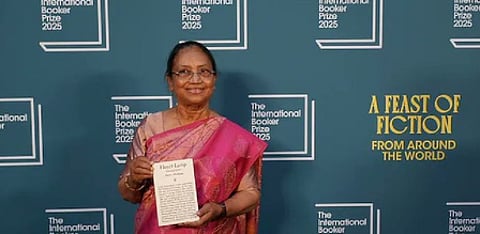

Banu Mushtaq, a Kannada writer and activist who recently made history as the first Kannada novelist to win the International Booker Prize, has been chosen to launch Karnataka's historic Mysuru Dasara Mahotsava this year.
The 77-year-old awardee from Hassan will declare the festivities open on September 22, 2025, with Vijayadashami scheduled for October 2.
The administration of Chief Minister Siddaramaiah announced Mushtaq as the chief guest, honouring her literary achievements. Her short story collection Heart Lamp, translated into English by Deepa Bhasthi, was awarded the prestigious literature award earlier this year for its moving depiction of Muslim women's struggles in Karnataka over three decades.
However, the decision has triggered a political row — kick-started by the Bharatiya Janata Party (BJP), India Today reports.
Expelled BJP MLA Basanagouda Patil Yatnal, taking to X (formerly known as Twitter), said that the participation of Mushtaq in the festival’s religious ceremony, by offering flowers and lighting a lamp to Goddess Chamundeshwari, was “in conflict with her own religious beliefs.”
“Madam needs to clarify whether she continues to follow Islam, which emphasises belief in only one God and one holy book, or whether she now believes that all paths ultimately lead to the same moksha (.sic),” he wrote.
Former Mysuru MP and BJP leader Prathap Simha also objected, saying, “We are proud of her achievements, and she has contributed a lot to literature. But does Bhanu Mushtaq believe in Goddess Chamundi? Has she ever followed our customs? Has she ever said she is a devotee of Goddess Chamundeshwari? Then why was she invited?”
Similarly, BJP state president BY Vijayendra said, “We respect Banu Mushtaq. If she accepts Hindu religion and beliefs, and then comes to inaugurate, I can understand. Deepa Bhasthi translated her work and both won the Booker Prize, but Siddaramaiah only invited Banu Mushtaq.”
Members of the ruling Indian National Congress government defended the move, stating that saying Dasara should not be viewed only through the lens of religion, as it is also a state event.
